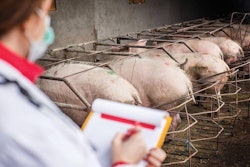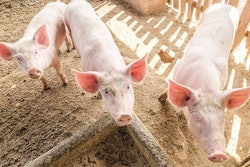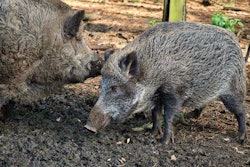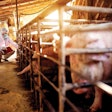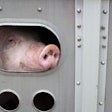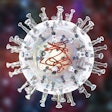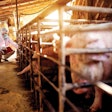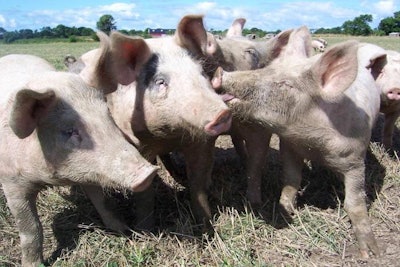
Country sees spike in deadly disease in domestic pigs
Although the country’s first cases of African swine fever (ASF) were reported more than one year ago, Romania has recently seen a spike in cases among domestic pigs, with two farms recently confirmed with the disease. There also have been cases at a farm in Ukraine and in backyard herds in Bulgaria, Moldova and Russia.
For several months after ASF first occurred in Romania last year, the disease appeared to be confined to the wild boar population and to small backyard herds. However, after a recent report of 128 new outbreaks affecting more than 26,300 domestic pigs has been followed by confirmation of the disease at a further two farms during September.
Latest to be affected were commercial premises of 2,000 and 4,700 pigs in the east and northwest of the country, according to the agriculture ministry’s official report to the World Organisation for Animal Health (OIE). Along with outbreaks in 46 backyard herds, Romania has lost more than 7,000 pigs to the disease through mortality or culling over the past few weeks alone.
In Ukraine, ASF was detected at a farm with more than 8,000 pigs after about 250 of the animals died in the central oblast of Zaporizhia, the state veterinary service has informed the OIE. The disease appears to have re-emerged in the region after an absence of about three months. The last confirmed outbreak in the oblast was at a farm at the end of June.
After previous ASF outbreaks, Ukraine’s animal health agency has declared the disease situation resolved in the centrally located oblasts of Poltava and Dnipropetrovsk. The declarations come after a period of two months or more without new cases in these areas where just one or two isolated outbreaks had been recorded.
Backyard, village herds infected in Russia, Bulgaria, Moldova
ASF has been confirmed in a new region of Russia for the first time. The virus was detected in a village herd in Saratov oblast in mid-September after four of the animals died, according to the official report to the OIE from the agriculture ministry in Moscow. Saratov is located in the Volga Federal District, where previous outbreaks have been confirmed this year, including at a backyard in the oblast of Nizhny Novogorod at around the same time.
ASF also appears to be spreading rapidly among domestic pig herds in Russia’s Far Eastern federal district.
The disease has returned to the Gagauzia autonomous region of the Republic of Moldova after an absence of about four months. ASF virus was detected after the majority of animals in a backyard herd of 40 died during the last week of September, according to the official OIE report.
Bulgaria has recorded its first ASF outbreak in Kardzhali, a province in the south of the country that borders Greece. All 10 animals were destroyed, the country’s agriculture ministry has informed the OIE.
Up to September 29, there have been 1,623 confirmed outbreaks of ASF among domestic pigs in Europe so far in 2019, according to the European Commission (EC). From this source, by far worst affected has been Romania (1,454 outbreaks), followed by Poland (46), Bulgaria (38), Ukraine (37), the Republic of Serbia (18), Lithuania (17) and Slovakia (11). Other European states with 10 or fewer confirmed outbreaks are Italy and Latvia.
Steep rise in ASF cases in Hungarian wild boar
“Several hundred” wild boar have been found dead in Hungary in the past few days, representing a sudden escalation in the ASF situation, reports Budapest Business Journal. With a single game park on the outskirts of the capital, Budapest, so badly hit, the authorities are now heavily restricting access to the area, and calling on pig farmers to increase biosecurity levels.
Over the past two weeks, Hungary’s agriculture ministry has reported to the OIE a total of 102 wild boar testing positive for the ASF virus at multiple locations in the northeast of the country, as well as 5 animals in the forest near Budapest, where the virus has been detected for the first time.
In Poland, a total of 146 wild boar were found to be infected with ASF between May 25 and July 4, according to agriculture ministry reports to the OIE over the past two weeks. Cases were all in the east of the country where all previous outbreaks have occurred.
Other European countries where the disease has been recently reported in wild boar to the OIE are Romania (19 animals), Latvia (7), and Russia and Slovakia (each with 3).
This year, there have been 4,583 confirmed outbreaks of ASF among European wild boar up to September 29, according to the EC. Poland has reported the most outbreaks (1,742), followed by Hungary (1,075), Romania (493), Belgium (479), Lithuania (369) and Latvia (249). Other European states reporting outbreaks in wild boar during 2019 are Bulgaria, Estonia, Italy, Slovakia and Ukraine.
Confirming its first ever cases of ASF, East Timor has become the 11th state to report ASF in Asia this year.
View our continuing coverage of the African swine fever outbreak.

